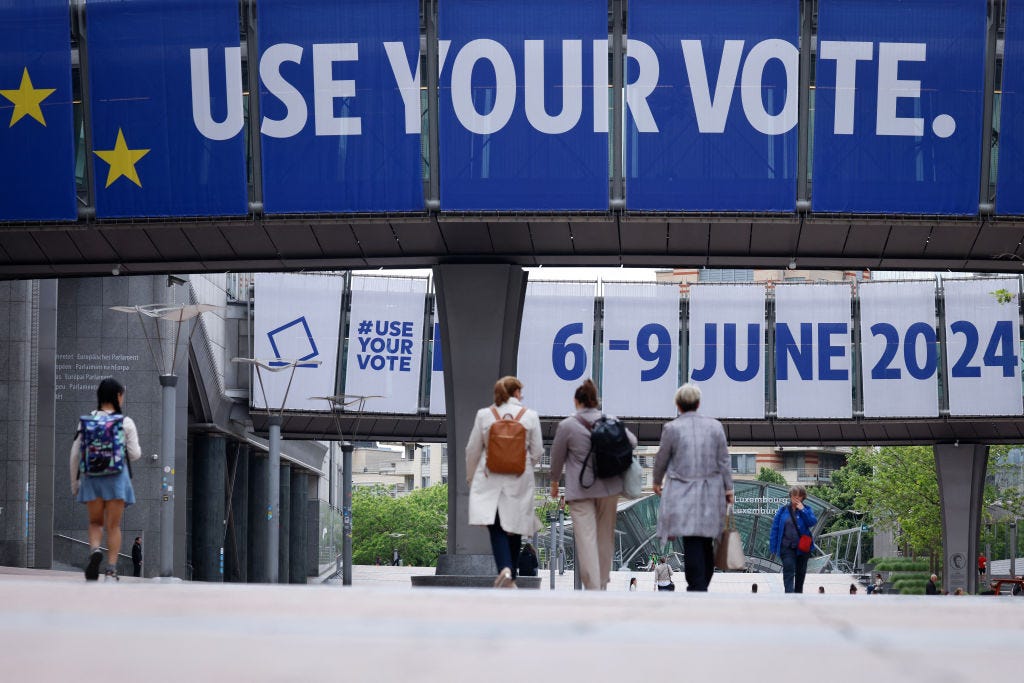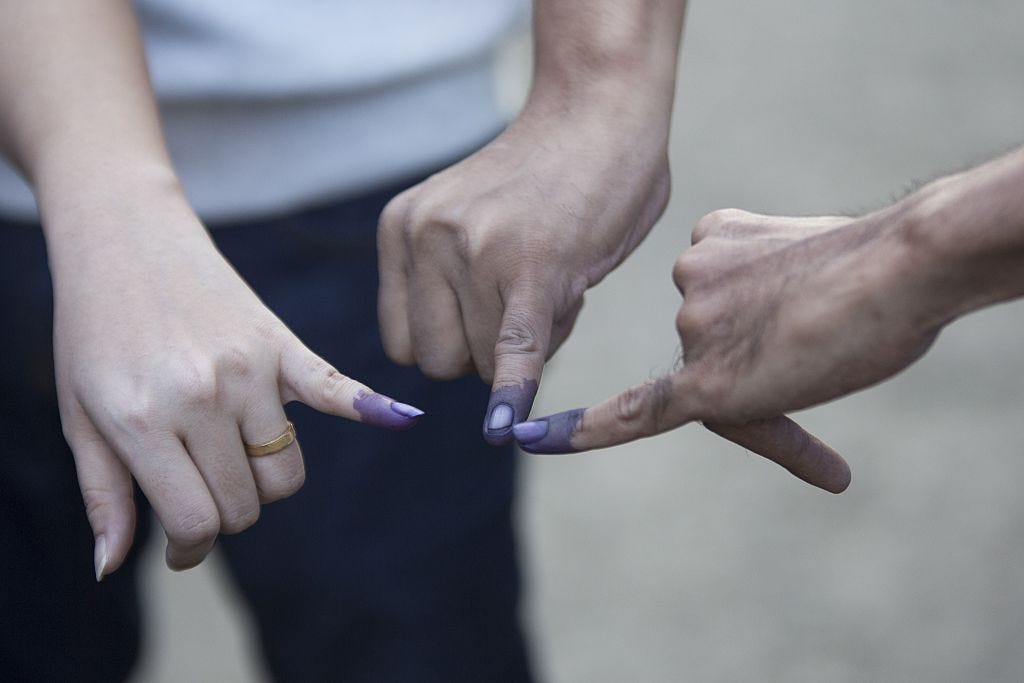The Times…. Are They A-Changing?
Elections, food systems, and climate action
Good news: I went on vacation for the first time since the beginning of this year! After the publication of the investigation on farmer representation, I needed a break, both physically and mentally, and away from news and gadgets.
I turned off notifications on my phone, switched off my computer, and brought two books. It was wonderful and I ate extremely well, as one is wont to do pretty much anywhere in Italy.
Bad news: I still checked e-mails, read news, and responded to Signal messages. My plan for a digital detox only half worked. And everywhere I went, I was confronted with posters of hopeful candidates vying for a place in the next European Parliament and party faithfuls canvassing for their chosen one.
Since I can’t get away from it, I thought I might as well write about elections for this week’s Thin Ink.

You’ve probably heard this line for the umpteenth time even before this year began.
2024 is the year of elections. By the end of the year, nearly half of the world’s population in 64 countries will have cast their votes.
As I write this, the European parliamentary elections, held every five years, are underway. I’ve noted before that they have often been plagued by low turnout, voter apathy, and any ills that national politicians could pin on Brussels and the EU bogeyman.
I don’t have any illusions of the EU as the bright, shining beacon of democracy in a dark world. But having been born and raised under a dictatorship, I value any opportunity citizens have to directly elect their representatives. And the European Parliament is the only EU institution where citizens of the 27-member bloc can do so.
But I belong to the other half of the world that will not be voting this year. In fact, I don’t know when or if I will have the chance to vote back home again.
You see, my country, Myanmar, had an election at the end of 2020, but the men with the guns didn’t like the outcome, so they took power by force, precipitating a civil war that has so far killed (by some estimates) at least 50,000 people including 8,000 civilians, displaced 2.7 million, and shrank the country’s middle class by half in the span of three short years.
Perhaps the rarity of elections back home explain why I have vivid memories of the two I have had the fortune to witness: the first election I’d encountered in my life, in 1990, and the first - and only - time I ever voted, 25 years later.
The first time, the whole country was abuzz for months, because we hadn’t had elections for 30 years. It was a year after another military dictator changed the country’s name from Burma to Myanmar, under the pretext that the latter was “more inclusive”.
Anyway, in the run-up to the elections, people were both hopeful and fearful. Hopeful of a better future. Fearful that the votes would be manipulated and the results won’t be honoured. The junta had arrested scores of members of the main opposition party and shot and killed unarmed protesters in cold blood just two years earlier.
Still, people turned out in force on May 27. Some data suggested the turnout was 73%.
On that a blazingly hot and sweaty day, I woke up to a near-empty household because most of my family members had gone to the polling station early in the morning. I was too young to vote so I was allowed to sleep in, although I wished I was with the lu-gyis (adults in Burmese) and being part of a huge political event.
Of course, I didn’t have a clear idea of what voting entailed, but I imagined it involved queuing - things in Myanmar at that time always involved queuing - and couldn’t wait for their return so I could hear how it all went.
They came back around midday. The polling station for our township was at a school, there were few shady areas, and the queue was long and slow-moving. My father, feeling unwell himself and worried about the health of our grandfather - his father-in-law - who was in his 70s, said he seriously considered leaving. Apparently my sister, who had just turned 18, put her foot down.
“She said, ‘No one is going home. We are all going to vote. We are not wasting a single vote,’” I remember him recounting her words to me, both him and my grandfather beaming with pride. Both have since passed away.
The opposition won nearly 60% of the vote but the military, then as now, decided they didn’t like the results.
On November 8, 2015, I continued their legacy, waking up before dawn to stand in a line so I could vote for the first time in my life.
There had been one more election between 1990 and 2015, but the 2010 polls were deemed neither free nor fair. Besides, I was out of the country and working surreptitiously as a journalist in a not-so-democratic Asian country so I’d told the Burmese embassy there that I was a marketing consultant. In other words, the situation was complicated.
But by 2015, Myanmar had undergone significant changes. Opposition politicians were in parliament following a by-election in 2012. Optimism was in the air and even xenophobic monks and racial riots didn’t dampen the world’s enthusiasm and hunger for a good news story.
On that November morning, I stood with hundreds of other voters, young and old, men and women, waiting for my turn. We felt a bond, a kinship, though we’d never met each other before. Even a power cut in the midst of it all didn’t spoil our mood.
The waiting and the voting took a little over an hour. Afterwards, a lady sitting at the desk by the exit gently guided my left pinkie into an ink pot in front of her. I took a picture of my finger as the deep purple stain spread over my skin and joy spread over me. I had joined the tens of thousands of fresh Burmese voters for whom it is now a badge of democratic honour.
In case you haven’t guessed, yes, I believe voting is a civic duty. Growing up in a dictatorship does that to you. It has also given me an abiding suspicion of strongmen (or women).
Did I have misgivings about the elections, the voting system (first-post-the-post), and the problem of malapportionment (when not all votes are created equal)? I did. Was I troubled by the choices of political parties and candidates before me? I was.
I wrote about my concerns, including how “as a Buddhist who learned to kowtow before I learned to walk, I also strongly disagree with the way religion is being used as a blatant political tool to retain the status quo” and my dissatisfaction with the-then opposition party NLD (co-founded by Daw Aung San Suu Kyi). As you can imagine, it didn’t go down well in some quarters.
But my fears of a return to the past where we are not even allowed to vote was stronger than my ambivalence. I’m sure some of my American readers are becoming familiar with that sentiment (if they aren’t already).
I can’t vote in the EU Parliamentary elections happening right now, but I am invested in the outcome, not only because I live here and the policies enacted by the next crop of parliamentarians will affect me, but also because it will have a tangible impact on existential issues like climate action and transforming our food systems.
Pretty much almost every poll and analysis has predicted a shift to the political right. The question is how far. This Washington Post has a good overview.
Self-interested politicians and groups often fear monger - of migrants, of rising food costs, of AI, of the spectre of war and hunger - to gain and maintain power.
But to me, these fears pale in comparison to a future we’re all sleepwalking towards: a future when parts of this continent will become too hot to live in or grow crops, and when the collapse of the pollinators and the pollution in the air and water make it too difficult for food production.
Then the people who demonise migrants will become migrants themselves, the food prices will soar even further, and so will social unrest and hunger. We are essentially voting for the nightmare scenario to come true.
Matina Stevis-Gridneff sums it well in this NYT analysis about the elections: “The Parliament that emerges from these elections, weak though it may be, will serve as a brake or accelerator for the crucial policies that will help shape Europe’s immediate future.”
Frankly, the thought that anti-nature, anti-social justice, anti-science, and pro-strongmen politicians will control EU institutions and dictate the terms of EU’s relationship with the rest of the world, whether with countries like mine or small-scale African farmers like the ones mentioned here, terrifies me.
I have to admit I’m feeling impotent. So I do what I normally do when I feel this way: I write, I talk, I inform and I hope that it leaves an imprint on somebody somewhere. For now, I’m taking small comfort in the results of the Indian elections and wishing “Good Luck” to Europe.
Thin’s Pickings
Backlight: Making your investigation count at election time. What we’ve learned - Lighthouse Reports
This is Lighthouse Reports’ podcast that goes behind the scenes to speak to reporters and editors about their latest investigations.
This week, Lighthouse Director Klaas van Dijken and myself touched on two very different (but very key) issues on the EU election agenda - EU border policy and the farmers protests - and how to engage voters with the findings of our latest journalistic work. Please have a listen.
Separating the Weetabix from the Chaff - Vittles
This piece by TABLE’s Jack Thompson traces the wheat from his family farm to Britain’s “favourite breakfast cereal” and found, along the way, how the consolidation of our food systems, from seeds to fertilisers to machinery to grain merchants, is affecting the farmers who feed us.
If you want to know why farmers are protesting, read this.
A Water Cirisis is on the Horizon. The World Must Take Action - Institute Affari Internazionali
My op-ed for Italian think-tank IAI as part of the Nexus25 project on water security and water governance, a topic that is often relegated to second tier but is absolutely essential for our health, our industries, and our food production.
As always, have a good weekend, and please feel free to share this post and send tips and thoughts on mastodon @ThinInk@journa.host, my LinkedIn page, twitter @thinink, or via e-mail thin@thin-ink.net.






Your thoughts on voting - something I never had to think about - landed with me... Thanks!
imprint successful. as always, great writing and palpable passion for the subjects you feature. Je zu din ba de